|
|
|
Sort Order |
|
|
|
Items / Page
|
|
|
|
|
|
|
| Srl | Item |
| 1 |
ID:
147933
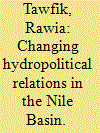

|
|
|
|
|
| Summary/Abstract |
A new hydro-political order is emerging in the Nile Basin. Upstream riparian states have improved their bargaining power vis-à-vis downstream countries by adopting a common position in the negotiations over a new framework agreement to govern the utilisation of the Nile waters. Some upstream riparians have unilaterally constructed hydraulic projects that threaten Egypt’s hegemonic position in the basin, the most notable of which is the Grand Ethiopian Renaissance Dam (GERD). Whether these developments will lead to a more equitable utilisation of water resources and a more cooperative order will depend on the policies of the riparian states, especially in the Eastern Nile. Respect of the Declaration of Principles on the GERD signed between Egypt, Ethiopia and Sudan could help build trust between the three countries after years of tensions around the project. Beyond that, a basin-wide plan for the utilisation of water resources would not only maximise the benefits from the river and address the common challenges facing the basin, but also reduce the political costs of tensions on future projects.
|
|
|
|
|
|
|
|
|
|
|
|
|
|
|
|
| 2 |
ID:
076581
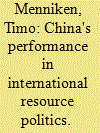

|
|
|
| 3 |
ID:
188062


|
|
|
|
|
| Summary/Abstract |
Building on a global research sweep of terrorist organizations’ (as well as other non-state actors such as separatist and insurgent groups) use of fresh water as a target, weapon, or source of control, this paper analyzes attacks on major water projects (specifically dams and other related infrastructure) in South Asia—the region identified to have had the largest number of recorded water-related violent incidents. Focusing on India, Pakistan, and Afghanistan, and the post 9/11 period through 2019, the paper explores how large water infrastructures (and their environs) have become hot spots for violence between states that use water development projects to consolidate power, garner local loyalty, and create a national narrative and non-state actors who attempt to target these same projects to assert indigenous self-determination, subvert state power, or challenge state authority through terrorist means. Since fresh water is shared across borders, dam projects can become entangled in regional political disputes further exacerbating violent conflict between state and non-state actors. Given its impacts on water resources, climate change may act as a “threat multiplier” by enhancing local grievances, providing both government and terrorist groups additional incentives for exploitation, and further contributing to instability. The analysis provided here borrows from and contributes to the fields of development, environment and security, and terrorism studies.
|
|
|
|
|
|
|
|
|
|
|
|
|
|
|
|
| 4 |
ID:
174445
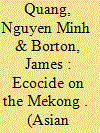

|
|
|
| 5 |
ID:
153222
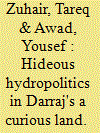

|
|
|
|
|
| Summary/Abstract |
Water is a contextual symbol in literature. It stands for many things, depending on how it is used in a literary work. It represents, among other meanings, cleanliness, life, salvation, purification, and redemption. In Susan Muddai Darraj's A Curious Land, water plays a pivotal role in conveying themes and ideas that are pertinent to the Palestinian-Israeli conflict. In particular, this article explores how Darraj draws on the multivalent connotations of water to aesthetically and thematically valorize some of the dynamics of the Palestinian-Israeli conflict. In a way, water intricately intertwines with the national Palestinian identity and it explains the causes of several Israeli assaults and aggressions on Palestinian territories and neighboring Arab countries. As the collection shows, Israeli hydropolitics and hydro-apartheid keep the Palestinians below the water poverty line in a bid to destroy their resilience and force them to emigrate. Hence, water in this collection acquires important meanings for the Palestinians, like rejuvenation, resistance, and rootedness.
|
|
|
|
|
|
|
|
|
|
|
|
|
|
|
|
| 6 |
ID:
182087
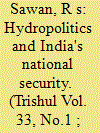

|
|
|
| 7 |
ID:
144710
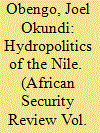

|
|
|
|
|
| Summary/Abstract |
This article analyses the political relationship between Ethiopia and Egypt. It aims to provide an analytical framework to unpack this complex relationship and assess the impacts that the Nile River has on the nature of this relationship. It further identifies geopolitical factors determining the impacts of the Nile River on frameworks of actions and political opportunity structures in which political actors operate. Accordingly, the different combinations of these determinants lead to the formation of political actors and ensuing actions that can fuel conflict, sustain the status quo or build peace. The article seeks to provide tentative answers to the following questions: what can be done or what mechanisms might be used to reduce the risk of conflict? What parties should participate and what will be their roles? And how can modern technology and science contribute to a possible solution?
|
|
|
|
|
|
|
|
|
|
|
|
|
|
|
|
| 8 |
ID:
115422


|
|
|
|
|
| Publication |
New Delhi, Academic Foundation, 2012.
|
| Description |
208p.
|
| Standard Number |
9788171889709
|
|
|
|
|
|
|
|
|
|
|
|
Copies: C:1/I:0,R:0,Q:0
Circulation
| Accession# | Call# | Current Location | Status | Policy | Location |
| 056839 | 333.91/POW 056839 | Main | On Shelf | General | |
|
|
|
|
| 9 |
ID:
133765
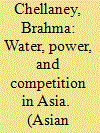

|
|
|
|
|
| Publication |
2014.
|
| Summary/Abstract |
At a time when Asia is at a defining moment in its history, water stress has emerged as one of its most serious challenges. Water shortages have not only stirred geopolitical tensions by intensifying competition over the resources of shared rivers and aquifers, but they also threaten Asia's continued economic rise.
|
|
|
|
|
|
|
|
|
|
|
|
|
|
|
|
| 10 |
ID:
147936
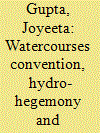

|
|
|
|
|
| Summary/Abstract |
The 2014 entry into force of the UN Watercourses Convention of 1997 could institutionalise water law globally, thereby countering hydro-hegemonic approaches. However, since the Convention is out of date; has been ratified by only 36, mostly downstream countries; does not require amendments of pre-existing treaties; and has no Conference of the Parties to ensure that it becomes a living treaty, its actual influence in addressing the evolving problems in transboundary river basins remains minimal. Nevertheless, it is not unimaginable that with an appropriate follow-up to this Convention, it could be converted into a living and relevant framework convention in the future.
|
|
|
|
|
|
|
|
|
|
|
|
|
|
|
|
| 11 |
ID:
147935


|
|
|
|
|
| Summary/Abstract |
The countries sharing the Lancang-Mekong River are entering a new era of hydropolitics with a growing number of hydropower dams throughout the basin. Three ‘powersheds’, conceptualised as physical, institutional and political constructs that connect dams to major power markets in China, Thailand and Vietnam, are transforming the nature–society relations of the watershed. In the process, new conditions are produced within which the region’s hydropolitics unfold. This is epitomised by the ‘Lancang-Mekong Cooperation’ framework, a new initiative led by China that proposes programs on both economic and water resource development, and anticipates hydrodiplomacy via China’s dam-engineered control of the headwaters.
|
|
|
|
|
|
|
|
|
|
|
|
|
|
|
|
|
|
|
|
|